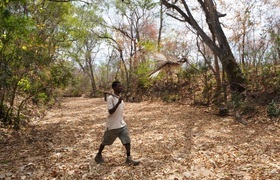Computers galore for conservation biologists
05 November 2009 | Story by Newsroom Hardware booty: Photographed at the sponsorship function were (from left) Dean Ferreira; and Kareemah Jacobs, both of the Nature Conservation Corporation, and Prof Phil Hockey; of the Percy FitzPatrick Institute of African Ornithology.
Hardware booty: Photographed at the sponsorship function were (from left) Dean Ferreira; and Kareemah Jacobs, both of the Nature Conservation Corporation, and Prof Phil Hockey; of the Percy FitzPatrick Institute of African Ornithology.
The Nature Conservation Corporation, based in the Westlake Business Park, has sponsored 15 computers for Conservation Biology Master's students at UCT's FitzPatrick Institute of African Ornithology.
This master's programme has undergone a significant revamp to its curriculum to keep pace with the rapidly changing science of conservation biology. Supported by the Faculty of Science, the team has been relocated to an improved facility. The new sponsored computers will underpin the course as a leading capacity-development opportunity for future conservation biologists.
"Conservation Biology has been termed the 'crisis discipline' and is among the most relevant of modern sciences, striving to balance the needs of people with those of nature," said the institute's director, Professor Phil Hockey.
"Our sponsorship of computers to the FitzPatrick Institute demonstrates how we value innovation and advancement within our sector, for the benefit of our natural environment," said the corporation's managing director, Dean Ferreira.
"We strive to be holistic and thorough in our approach to conservation, as we want what is best for the environment."
The FitzPatrick Institute, which will celebrate its 50th anniversary in 2010, views conservation biology as the scientific study of how best to sustain and manage linked systems of people and nature.
"South African society has experienced a set of massive changes in the past 20 years, and much of the resulting dynamism and openness to new ideas is mirrored in South African conservation," Hockey said.
"Similarly, the discipline of conservation biology is undergoing a paradigm shift, in which outdated notions of preservation and paternalism are being replaced by an ethic that recognises the complexity of linked social and ecological systems and the critical need for solid interdisciplinary research.
"The FitzPatrick Institute is contributing to this transformation through research and teaching, while also encouraging and supporting sound, action-oriented science," he concluded.
 This work is licensed under a Creative Commons Attribution-NoDerivatives 4.0 International License.
This work is licensed under a Creative Commons Attribution-NoDerivatives 4.0 International License.
Please view the republishing articles page for more information.










